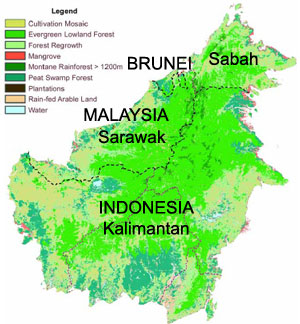Borneo’s rainforest protected
Borneo’s rainforest protected
Rhett A. Butler, mongabay.com
February 12, 2007
An agreement to protect large areas of forest in central Borneo was officially signed by three governments that share the island. Brunei Darussalam, Indonesia and
Malaysia will “conserve and sustainably manage” the so-called “Heart of Borneo”, one of the most biodiverse, and threatened, tropical rainforests in the world. The World Wildlife Fund (WWF) played a critical role in the initiative’s creation.
“The Heart of Borneo is one of the most biologically diverse habitats on earth and protecting this sanctuary could not be possible without the commitment and leadership of these three visionary governments,” said Carter Roberts, president and CEO of World Wildlife Fund. “This declaration is a monumental success for conservation and for the millions of people who rely on Borneo’s natural resources for their very livelihood. Enacting sustainable practices in this region will help ensure its preservation for generations to come.”
 Major vegetation types of Borneo. Map modified from WWF’s “Borneo: Treasure Island at Risk” report. The map is based on Langner A. and Siegert F.: Assessment of Rainforest Ecosystems in Borneo using MODIS satellite imagery. Remote Sensing Solutions GmbH & GeoBio Center of Ludwig-Maximilians-University Munich, in preparation, June 2005. Based on 57 single MODIS images dating from 11.2001 to 10.2002 with a spatial resolution of 250 m |
WWF says that the Heart of Borneo declaration will formally end the plan to create the world’s largest palm oil plantation in Kalimantan along Indonesia’s mountainous border with Malaysia. The plan — backed by Chinese investments — was widely criticized by environmental groups who said it was a cover for logging and would cause wide-ranging ecological damage to critical forest areas. Driven by booming demand for biofuels and edible food oils, oil palm cultivation has expanded rapidly in Borneo in recent years, climbing from less than 200,000 hectares in 1984 to nearly 2.6 million hectares in 2004, according to WWF.
While the new agreement offers for hope Borneo’s biologically rich forests, it is overshadowed by the caveat that protected areas have not faired well in Borneo — especially the Indonesian territory of Kalimantan — over the past decade. A 2004 study published in Conservation Biology showed that between 1997 and 2002 nearly 79 percent of forest loss took place within the boundaries of designated or proposed protected areas. Overall Borneo lost nearly 17 million hectares (42 million acres) of forest between 1985 and 2002. In recent years deforestation rates have since accelerated due large-scale land clearing for oil palm plantations and massive fires, pollution from which regularly fouls air quality as far away as Thailand and Australia. New projections suggest that the island will lose nearly all of its forest cover outside of protected areas by 2015.
|
Borneo slideshow: click image to play. Larger version. |
The loss of Borneo’s forests is having a global impact. Carbon dioxide emissions from fires in the island’s peat forests have helped Indonesia become the world’s third largest greenhouse gas polluter despite having the world’s 22nd largest economy.
Borneo’s forests are some of the most biodiverse on the planet. According to WWF, the island is estimated have at least 222 species of mammals (44 of which are endemic), 420 resident birds (37 endemic), 100 amphibians, 394 fish (19 endemic), and 15,000 plants (6,000 endemic) — more than 400 of which have been discovered since 1994. Surveys have found more than 700 species of trees in a 10 hectare plot — a number equal to the total number of trees in Canada and the United States combined.
Related articles
Why is oil palm replacing tropical rainforests?. Recently much has been made about the conversion of Asia’s biodiverse rainforests for oil-palm cultivation. Environmental organizations have warned that by eating foods that use palm oil as an ingredient, Western consumers are directly fueling the destruction of orangutan habitat and sensitive ecosystems.
98% of orangutan habitat in Borneo, Sumatra gone by 2022. A report from the United Nations Environment Programme (UNEP) today warns that illegal logging is rapidly destroying the last remaining habitat for orangutans in Borneo and Sumatra. The report says that up to 98 percent may be destroyed by 2022 without urgent action.
China invests in $5.5B biofuels project in Borneo, New Guinea. China has agreed to invest in a $5.5 billion biofuels project on the islands of New Guinea and Borneo. The plan promises to be controversial among environmentalists who say that it will destroy some of the world’s most biodiverse — and threatened — ecosystems on the planet.
Borneo governor arrested in rainforest for palm oil fraud. The governor of East Kalimantan on Indonesian part of the island of Borneo has been suspended and faces life in prison for his involvement in an oil palm plantation scheme that caused the deforestation of a million hectares of tropical rainforest.







